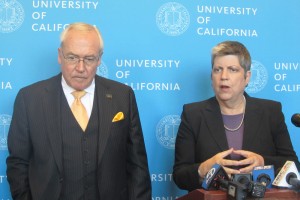University of California President Janet Napolitano, in her opening remarks to the UC Board of Regents Wednesday, outlined several long-term plans for the University. Although she touched on many big ideas, her speech lacked specifics on how she will actually bring about change, especially on one critical issue: state funding.
Napolitano spent a large portion of her speech Wednesday giving detailed outlines of her plans for making the UC a zero-net energy consumer by 2025 and policies to increase technology transfer by pushing UC research and patents into the market. But the more pressing issue of insufficient state funding did not receive the same amount of attention.
To secure what should be her central goal of increasing state support to the University, Napolitano needs to reach beyond her home base in Oakland to make herself a present force in Sacramento. By doing so, she can make herself a poster child for increased UC funding.
Although the long-term proposals highlighted in Napolitano’s speech are feasible and give her constituents a good idea of her overarching vision, they don’t satisfy or reassure students of the University’s budgetary future. The issue Napolitano needs to prioritize is mitigating and reversing the effects of tuition increases that have beset the University for years.

While some signs point to increasing state support for the UC – the regents approved a 5 percent base funding increase during their meeting Thursday – other omens are less auspicious. Brown cautioned that tuition increases were likely the only way to bring in future revenue in the long run, a situation he described as a “reality sandwich.”
But Napolitano needs to make it clear Brown’s “reality sandwich” is unpalatable. The UC can’t afford to take no for an answer on the issue of increasing state support.
In her remarks, she promised to freeze tuition for the 2014-15 school year in order to buy time to make tuition tenable and predictable for students. But this move still doesn’t address the core cause of the tuition rises: the decline of state funding.
Cuts to the UC budget have resulted in unpredictable tuition and a restriction of accessibility to a UC education.
Though Napolitano nodded to the goal of stabilizing tuition in her remarks Wednesday, she needs to create a detailed and feasible plan of action to stabilize the UC’s financial state. This action plan has to include bolstering state support to its pre-recession level.
In the public comments portion of the UC Board of Regents meeting on Tuesday, one commenter accused Napolitano of being a political opportunist. Although this comment was meant to be negative, in trying to achieve more sufficient UC funding, some political opportunism is called for.
In her remarks to the regents, Napolitano said, “any successful tuition policy will require a clear, predictable partnership with the state.” Any such partnership must include a commitment by the state to reverse the damage done by dramatic disinvestment in the UC.
Using the fact that next year is an election year – coupled with her political experience – can give Napolitano an advantage in rallying for extra state funding.
While discussing her sustainability initiative she mentioned the “political goodwill” the UC has with the governor in decreasing energy use, but this goodwill would be better served in securing funding for the University.
Once she secures funding, Napolitano can focus on other issues she considers important to the University, like streamlining the transfer student process and expanding the UC’s programs to accommodate more transfer students.
If Napolitano makes a point of cajoling legislators and gaining allies in Sacramento to implement a concrete plan of action to improve the UC’s financial state a priority, her tenure will bring to the UC the change it has been waiting for.
